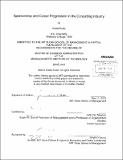| dc.contributor.advisor | John Van Maanen. | en_US |
| dc.contributor.author | Kurtz, Kristel (Kristel Edith Elaine) | en_US |
| dc.contributor.other | Sloan School of Management. | en_US |
| dc.date.accessioned | 2012-09-13T18:59:44Z | |
| dc.date.available | 2012-09-13T18:59:44Z | |
| dc.date.copyright | 2012 | en_US |
| dc.date.issued | 2012 | en_US |
| dc.identifier.uri | http://hdl.handle.net/1721.1/72890 | |
| dc.description | Thesis (M.B.A.)--Massachusetts Institute of Technology, Sloan School of Management, 2012. | en_US |
| dc.description | Cataloged from PDF version of thesis. | en_US |
| dc.description | Includes bibliographical references (p. 39). | en_US |
| dc.description.abstract | For people of equal aptitude and accomplishment, differences in career progression to the senior ranks of a professional services firm are often attributed to the presence or absence of sponsorship from senior executives. Senior advocates play a critical role in career advancement by identifying opportunities and by giving proteges the chance to compete for those opportunities. My hypothesis is that people who desire advancement need a clear sponsor within an organization in order to plan a path forward and to bring visibility to their past accomplishments and their future potential. The hypothesis was evaluated in the consulting industry. The basis for the research was a combination of field study interviews and an experimental survey. The field study involved interviewing Senior Executives in the consulting industry who have chosen to make a long-term career in the industry and those who have moved onto other industries. Vignettes of the interviewee's description of their career progression were developed and survey tested with mid-career executives. The survey participants rated the competency, level of sponsorship, and promotion readiness of the candidate. Varying the candidate's gender across the surveys also tested the effect of gender on promotion rating. From the survey results, competency was the most significant predictor of promotion with female gender having a negative, but smaller, yet still statistically significant effect. Sponsorship did not have a statistically significant effect on promotion within the survey study. However, sponsorship was identified in addition to competence and opportunity as a key factor to interviewee's success. This difference in sponsorship indicates discontinuity between described practice and observed interpretation. | en_US |
| dc.description.statementofresponsibility | by Kristel Kurtz. | en_US |
| dc.format.extent | 50 p. | en_US |
| dc.language.iso | eng | en_US |
| dc.publisher | Massachusetts Institute of Technology | en_US |
| dc.rights | M.I.T. theses are protected by
copyright. They may be viewed from this source for any purpose, but
reproduction or distribution in any format is prohibited without written
permission. See provided URL for inquiries about permission. | en_US |
| dc.rights.uri | http://dspace.mit.edu/handle/1721.1/7582 | en_US |
| dc.subject | Sloan School of Management. | en_US |
| dc.title | Sponsorship and career progression in the consulting industry | en_US |
| dc.type | Thesis | en_US |
| dc.description.degree | M.B.A. | en_US |
| dc.contributor.department | Sloan School of Management | |
| dc.identifier.oclc | 808384017 | en_US |
